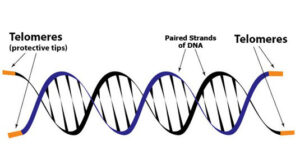Telomere Testing
Telomeres are the Key to Longevity

In the heart or nucleus of a cell, your genes can be found on twisted, double-stranded molecules of DNA called chromosomes. On the very ends of the chromosomes are stretches of DNA called Telomeres. Telomeres are sections of genetic material at the end of each chromosome whose primary function is to prevent chromosomal “fraying” when a cell replicates. They also carry some secret knowledge of the way we age on a cellular level. To put it simply, Telomeres are like the plastic tip covers on shoelaces because they prevent chromosome ends from tearing, fraying and adhering to each other.
Orthomolecular Nutrition and Wellness Center now offers a Telomere Test that can determine the length of a patient’s Telomeres in relation to the patient’s age.
As a cell ages, it divides and the Telomeres get shorter. When the Telomeres get too short, the cell will no longer be able to divide, therefore, it will cease to be active and ultimately the cell will die. This is part of a normal biological aging process. Unfortunately, it can also lead to cancer, disease and can put you at a higher risk for premature death. Much like a pencil eraser gets shorter each time it’s used; Telomeres get shorter each time a cell divides. Telomeres are like little dynamite fuses within our own bodies.
In addition, when the Telomere becomes too short, essential parts of the DNA can be damaged in the replication process. It’s at that point that scientists have noticed cells stop replicating. In humans, on average, a cell can replicate about 50 times before the Telomere becomes too short.
Telomere length can affect the aging process. Research has found that when individuals were divided into two groups according to the lengths of their Telomeres, the group with longer Telomeres lived on average five more years then those in the group with the shorter Telomeres. This study, along with others like it, suggests that a person’s lifetime span may directly correlate with longer Telomere lengths.
When a patient takes one of our Telomere Tests, they will receive a report which details their Telomere Score. This is calculated by looking at the patient’s average Telomere length in peripheral whole blood cells. This average is then compared to Telomere lengths from a population sample of the same age range of people to determine the patient’s Percentile Score. From these figures, we then can figure out a person’s biological age.
These results are telling and significant to both the practitioner and the patient. To date, age adjusted Telomere length is the best method to assess biological aging using structural analysis of chromosomal change in the Telomere. Orthomolecular Nutrition and Wellness Center offers a specified protocol with specialized therapies, as well as helpful lifestyle modifications and counseling which are all directed at slowing the loss of Telomere length. In turn, these adjustments can slow the aging process and potentially prevent a host of age-related diseases and premature death.
Orthomolecular Nutrition and Wellness Center recommends a patient be tested once a year. The first Telomere Test will determine where the patient is on the biological age spectrum. If the test comes back with a less than desirable outcome, Orthomolecular Nutrition and Wellness Center’s qualified practitioners will offer specific counseling geared towards each patient’s situation. Once the patient’s specific protocol has been developed, they can begin to enact those changes to their lifestyle right away, thus, beginning the process of healing their body from the inside-out. We suggest that the patient comes back for follow up visits with the practitioner every three to four months to go over these modifications, answer any questions they may have and to discuss any concerns. We feel the optimal time to be retested is one year after the first test, with annual tests to follow. It is not unusual to see optimal differences in Telomere lengths after these changes and modifications have been made to a person’s life.
A big part of the protocol specifically designed for each patient at Orthomolecular Nutrition and Wellness Center is based on nutritional supplementation in the form of our own high quality line of pharmaceutical and physician grade oral supplements, as well as IV Nutrition Therapy. Studies show that oxidative stress will shorten Telomere lengths and cause aging in cellular tissue. Antioxidant supplements can potentially reduce oxidative stress very efficiently. With the right (“Ortho”) amounts, increasing antioxidant capacity, at the cellular level, through targeted supplementation, proves critical to maintaining Telomere length. Recent evidence suggests that a high quality, balanced multi-vitamin will also help maintain Telomere length. Specifically, studies have linked longer Telomeres with levels of Vitamin E, Vitamin C, Vitamin D, Omega-3 Fatty Acids and Antioxidants, such as Resveratrol and Glutathione. In addition, homocysteine levels have been inversely associated with Telomere length, suggesting that reducing homocysteine levels via Folate and Vitamin B supplementation may decrease the rate of Telomere loss. Similarly, conditions such as cardiovascular disease, insulin resistance, diabetes, hypertension, atherosclerosis and even dementia affect Telomere length. Correcting subclinical nutritional deficiencies that may contribute to such diseases are crucial for Telomere maintenance.
Orthomolecular Nutrition & Wellness Center offers a lifestyle and supplement protocol that will greatly reduce factors that attribute to the shortening of Telomeres, hence positively affecting your biological age. Call today to set up an appointment to get your Telomere Length Test and find out your biological age! Call 727-518-9808 or go to www.OrthoLiving.comfor more details.
